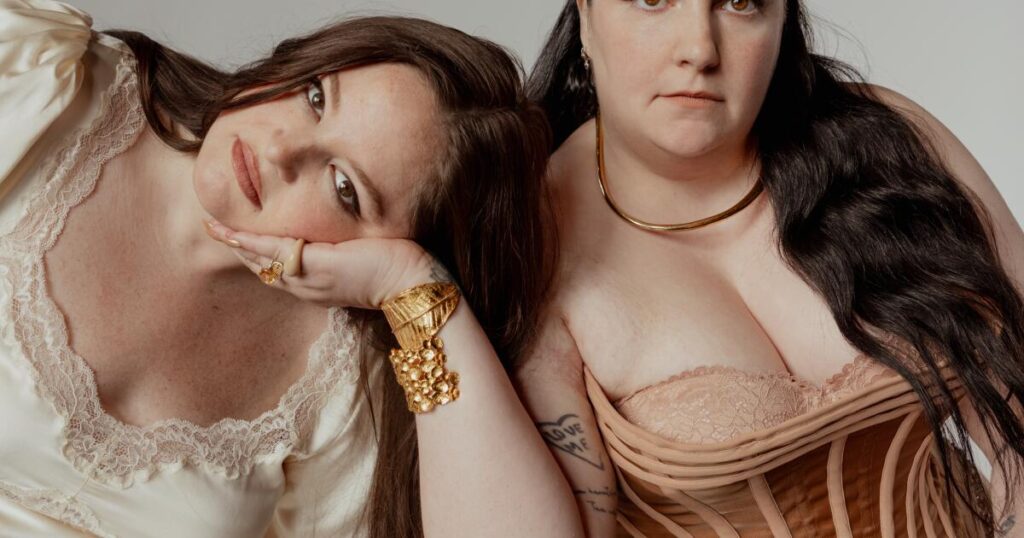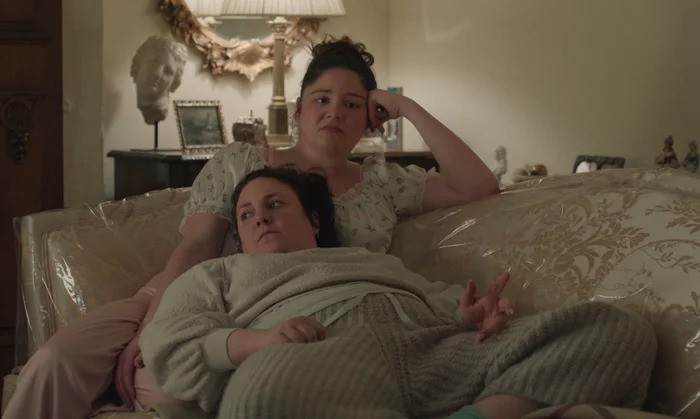In a cultural moment obsessed with “clean girl” aesthetics, curated minimalism, and palatable femininity, Lena Dunham’s new Netflix series Too Much feels like a thunderclap — messy, emotional, and defiantly imperfect. It’s a show that dares to lean into awkwardness, that gives voice to women who are often told to quiet down, shrink themselves, or smile more. And at the heart of this raw, sometimes hilarious, sometimes heartbreaking series is Megan Stalter, who plays Jessica — a woman navigating the wreckage of heartbreak, the fear of reinvention, and the constant internal whisper: “Am I too much?”
Let’s get this out of the way: Too Much is not for everyone. But it’s not trying to be. For those who found Dunham’s earlier work — especially Girls — divisive or even alienating, this show may come as a surprise. It’s still steeped in Dunham’s signature blend of self-exploration and cringe comedy, but here, it’s softened with more self-awareness, more compassion. There’s a tenderness under the layers of awkward humor that feels earned. Grown. And perhaps that’s the point — this is Lena Dunham’s grown-up heartbreak story, told through the chaotic, poignant, and deeply relatable Jessica.
From the very first episode, Jessica is hard to miss. She’s not the kind of protagonist who quietly fades into a scene — she barrels into it, often emotionally bleeding, always uncertain, and usually saying too much. Played with astonishing honesty by Megan Stalter, Jessica is a New Yorker who has just been dumped by her long-time boyfriend, played by The Marvelous Mrs. Maisel’s Michael Zegen. And not just dumped — replaced. With a gorgeous, seemingly effortless social media influencer (Emily Ratajkowski, playing a version of the kind of women Instagram loves and real-life exes dread).
Jessica is undone. She stalks the influencer online, rewatches old messages from her ex, and creates video diaries that are half confession, half fantasy — as if she’s speaking directly to the woman who “won.” She’s spinning in grief and jealousy, performing her pain like a one-woman off-Broadway show.
When a job takes her to London, she sees it as a chance to hit reset — but it’s not that easy. Wherever Jessica goes, her emotional luggage follows, packed to bursting with insecurities, unresolved trauma, and the aching question: Why wasn’t I enough?
And then she meets Felix.
Played by Will Sharpe — best known to American audiences from The White Lotus — Felix is a British indie musician who’s seen better days. He’s sober, quietly brooding, and carries his own romantic baggage. The moment Jessica and Felix meet, there’s an immediate pull — but also the awkward hesitations that anyone who’s been recently heartbroken knows well. The desire to connect competes with the fear of repeating mistakes.
What unfolds between them isn’t a fairy tale, and that’s the beauty of it. Their romance feels lived-in, tentative, full of false starts and emotional misfires. Jessica second-guesses every moment, wondering if Felix actually likes her, if she’s making a fool of herself, if she’s reading signs that don’t exist. Meanwhile, Felix — reserved and emotionally cautious — tries to navigate the emotional whirlwind that is Jessica.
Their chemistry is subtle but undeniable. It’s not about grand gestures or perfect kisses. It’s about lingering glances, quiet confessions, shared silences, and awkward vulnerability. It’s about learning how to be seen when you’ve spent your life hiding behind too muchness.
Too Much belongs to that rare category of shows that revel in discomfort. It’s cringe comedy elevated by emotional depth. Yes, there are scenes that will make you want to crawl out of your skin — Jessica breaking into her ex’s apartment, or launching into way-too-personal conversations with near-strangers — but these moments aren’t just for laughs. They’re illuminating. They show us who she is: a woman who’s been told her whole life to tone it down, and is now flailing in the effort to be someone else.
But here’s the magic of the show — it never punishes Jessica for being “too much.” It lets her exist in all her messiness. It doesn’t shame her for feeling too deeply, loving too hard, or speaking too honestly. It allows her to be vulnerable without making her the butt of the joke.

Much of that magic comes from Megan Stalter’s performance. Known for her breakout role in Hacks, Stalter brings a frantic, deeply empathetic energy to Jessica. Her comedic timing is razor-sharp, but it’s her emotional range that gives the series its heart. She plays Jessica like a raw nerve — always on the brink of laughter or tears, often both at once.
While the relationship between Jessica and Felix is the show’s emotional spine, Too Much isn’t just a love story. It’s a story about self-worth. About rebuilding after emotional devastation. About learning to trust again — not just other people, but your own instincts.
Jessica’s journey isn’t linear. She doesn’t land in London and suddenly find herself. She spirals, stumbles, makes bad choices, doubts everything. But she also grows. Slowly. Imperfectly. And crucially, without losing the core of who she is.
There’s a line in the show where Jessica says that adulthood is just doing things you don’t want to do. Felix counters with the idea that maybe it’s about making time for what you do want. The moment is simple, but it hits like a gut punch. Because for Jessica — and for so many women — life has never been about what she wants. It’s been about surviving, pleasing, performing, and apologizing. Too Much gives her a different script. One where she gets to take up space. Even when it’s messy. Especially when it’s messy.
The city of London is more than just a setting in Too Much — it’s a character in its own right. Dunham trades in the polished rom-com aesthetic for something grittier, more authentic. Think damp flats, dive bars, gray skies, and late-night walks. It’s a place where you can disappear, or reinvent yourself. Or both.
The show’s visual style matches its emotional tone — moody, intimate, a little chaotic. It feels lived-in, like Jessica herself. The camera lingers on faces, on silences, on the awkward spaces between words. It doesn’t rush. It trusts the audience to sit with discomfort, to lean into the quiet moments, to listen.
One of the show’s delights is its cast of guest stars. Naomi Watts, Rita Wilson, and Lena Dunham herself all make appearances, but they’re never distractions. They blend into the world Dunham has created, enhancing rather than overshadowing the central story. These characters — like Jessica — are all trying to figure it out. There’s no sage advice, no magical fix. Just flawed, funny people doing their best.
And that’s perhaps the most revolutionary thing about Too Much: it resists resolution. It doesn’t tie things up with a neat bow. It doesn’t promise that love will fix everything, or that self-acceptance is a final destination. It just shows us a woman trying. Failing. Learning. Trying again.
Though Lena Dunham doesn’t play Jessica, her fingerprints are all over the show. The dialogue, the emotional honesty, the willingness to mine personal pain for story — it’s all classic Dunham. And it’s no surprise that Too Much is semi-autobiographical. Felix is reportedly inspired by Dunham’s real-life ex, music producer Jack Antonoff. That knowledge adds another layer to the show — a sense of emotional truth, even when the story veers into fiction.
But this time, Dunham steps back and lets someone else carry the torch. In Megan Stalter, she’s found the perfect stand-in. Stalter captures the neurotic brilliance, the chaotic longing, and the self-sabotaging patterns that Dunham has built her career around — but she adds a new flavor. A softness. A vulnerability that never feels performative.
Together, they’ve created something special: a show that’s as funny as it is painful, as chaotic as it is honest. A show that refuses to make its protagonist smaller, quieter, or more palatable. A show that understands that being “too much” is often just another way of being fully human.

In a media landscape where so many female characters are flattened into types — the cool girl, the hot mess, the stoic professional — Too Much gives us someone real. Someone we recognize. Someone we’ve been.
Jessica may not have it all together. She may overshare, overreact, overthink. But she’s trying. And in her trying, she becomes a mirror for anyone who’s ever felt like their emotions were too big, their personality too loud, their desires too inconvenient.
She’s not “too much.” She’s just enough.
And Too Much? It’s exactly what television needs right now.



